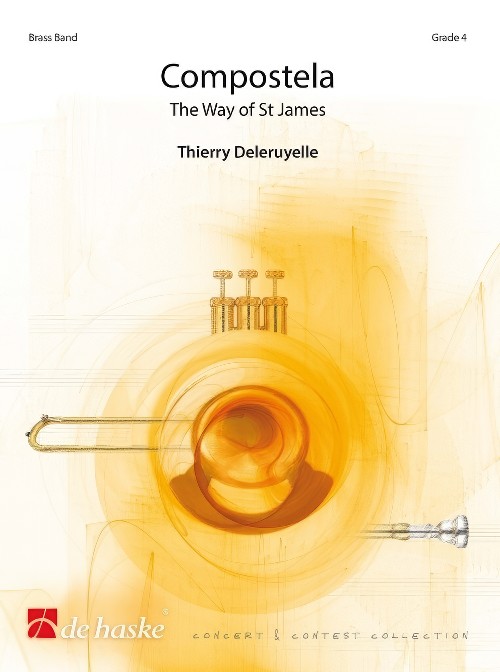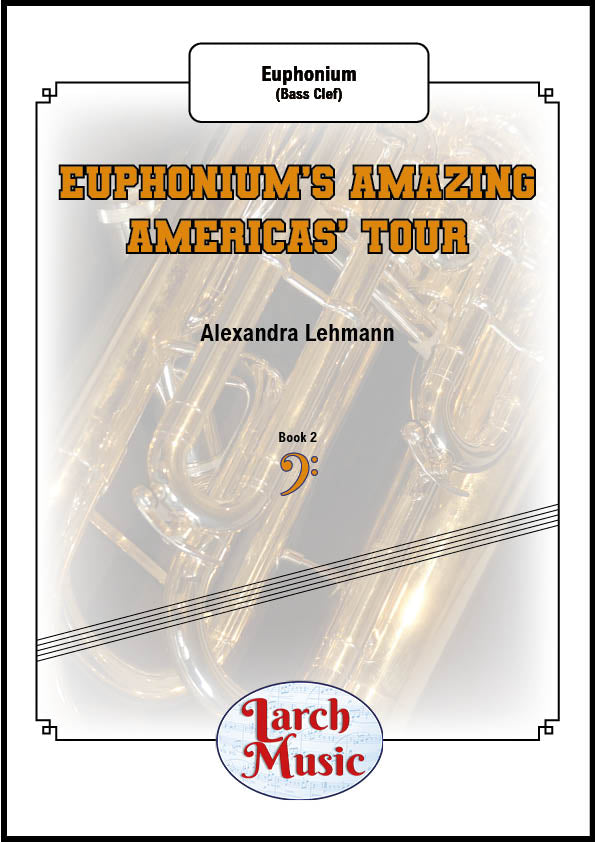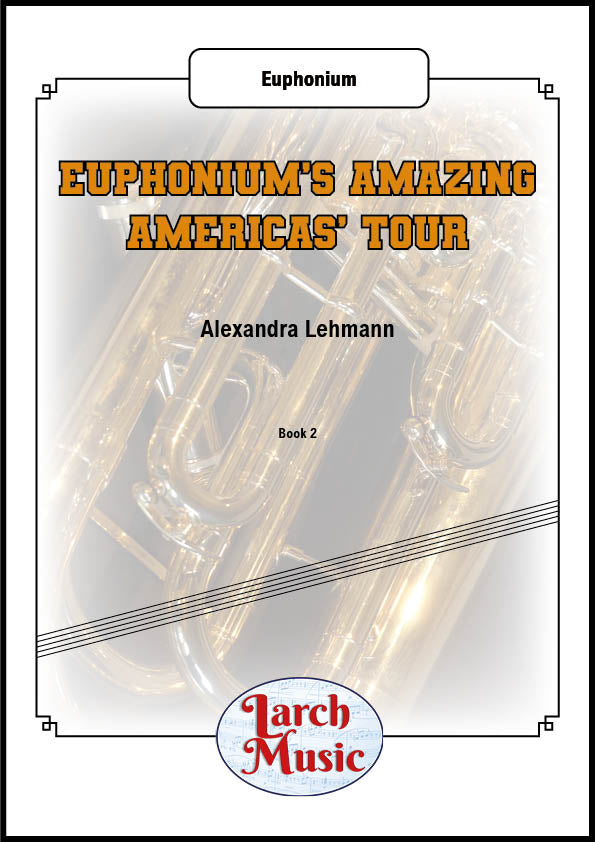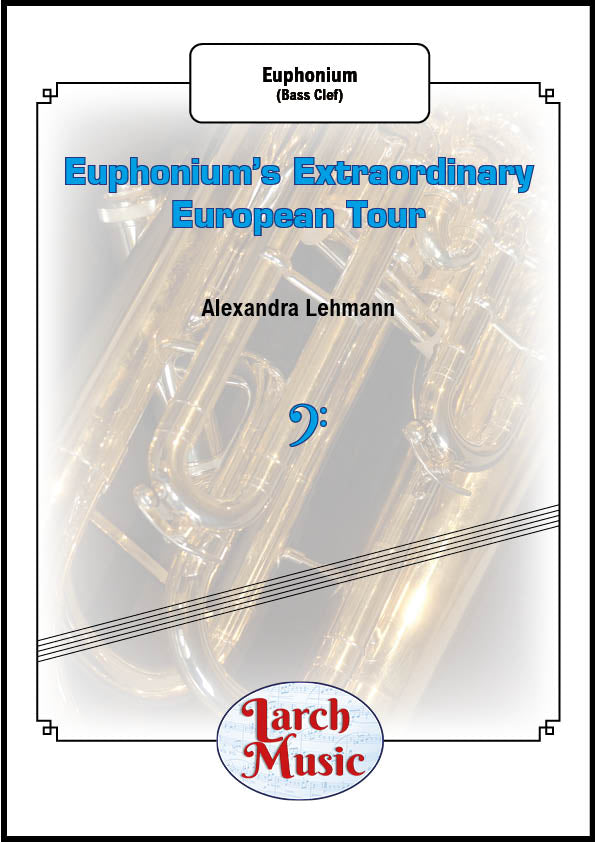Results
-
 £104.99
£104.99Cambridgeshire Impressions - Rieks van der Velde
In a four-part composition Rieks van der Velde takes us to the richly varied area surrounding the university city of Cambridge. The Dutch composer was especially inspired by the atmosphere of Cambridgeshire, the county which lies north ofLondon. 1. The Journey. Although on arrival the area looks peaceful and friendly, the ruggedness of its inhabitants and landscape have an unmistakable influence on the music. In the course of the tour, which starts with an Allegromovement, we are shown the vitality, energy and freshness of the Cambridgeshire countryside. Short themes, swift and sudden motifs and rhythmical patterns supported by the drive of percussion instruments give expression to this image. Thefirst part is concluded by two Calmo movements in which the music expresses how the cathedral in the city of Ely comes into sight and is gradually approached. 2. Visit to Ely Cathedral. The famous Norman cathedral church of Ely, whichwas built in 1109, has attracted tourists from all over the world apart from being a place of worship and heritage site. A cornet solo introduces the contemplative mood of the composition at this point. The mystical atmosphere of thecathedral runs through this lyrical part like a continuous thread. 3. The Pub. The thirst caused by this intensive journey makes a visit to the local pub a definite must. These "public houses", which may be open until the earlyhours of the morning, offer all kinds of entertainment. Drinks are served liberally and the atmosphere is lively. 4. The Journey Back. Time has flown: In other words, the moment of departure has come sooner than one would havewished. In a flashback which recaptures elements of the first part of the composition we say goodbye to Cambridgeshire in a fitting manner. Two scintillating final measures bring us abruptly back to the present.
Estimated dispatch 5-14 working days
-
 £99.99
£99.99Compostela (Brass Band - Score and Parts) - Deleruyelle, Thierry
The Way of St. JamesFour roads lead to Santiago, so begins the Book of the Pilgrim. Written in the 12th century, the Codex Calixtinus opened the way for pilgrimage from most cities in Europe and North Africa to Santiago de Compostela, in Spain. Compostela - The Way of St James describes the pilgrims' journey. After a slow introduction, a brilliant theme announces the start of the journey. The arrival in Spain is indicated by incantatory chants and majestic chords. Finally, the music softens as the pilgrims venerate St James.Duration: 11.00
Estimated dispatch 7-14 working days
-
£44.95
Trailblazers (Brass Band - Score and Parts) - Mackereth, Andrew
This overture draws its inspiration from the story of the first Household Troops Band. It tells the story of the 1887 band, the subsequent lull of nearly a hundred years and the re-awakening of the Troops phenomenon in 1985. It was originally written in 1995 and featured prominently by the band on its North American tour of 2002. Given the history of the Household Troops Band, it is fitting that this composition is preoccupied with marching. It begins with a marching song played by a solitary muted cornet, symbolic not only of the call to bandsmen to join the evangelical effort but also a muso-dramatic device to indicate the steady increase in members and technical ability! The music quickly develops into stirring versions of 'A robe of white' and 'Storm the forts of darkness' with two early day Salvation Army tunes crucially adding to the narrative; 'Marching on in the light of God' and 'Soldiers of our God, arise!' The second section is a reflective setting of the Herbert Booth song, 'The penitent's plea'. This song serves to represent the many people who were 'saved' during those early day campaigns. The expressive music transports the listener through a period of uncertainty and angst until finally reaching the song, 'There is a message, a simple message, and it's a message for us all'. The final section deals first with the emergence from the annals of history with the muted cornet figure again before, symbolically, the present day band bursts forth with an emphatic statement of 'Would you be free from your burden of sin? There's power in the blood'. The stirring climax represents a fitting tribute to those gallant pioneering musicians and their equally impressive and dedicated contemporaries.
Estimated dispatch 7-14 working days
-
£22.50
Trailblazers (Brass Band - Score only) - Mackereth, Andrew
This overture draws its inspiration from the story of the first Household Troops Band. It tells the story of the 1887 band, the subsequent lull of nearly a hundred years and the re-awakening of the Troops phenomenon in 1985. It was originally written in 1995 and featured prominently by the band on its North American tour of 2002. Given the history of the Household Troops Band, it is fitting that this composition is preoccupied with marching. It begins with a marching song played by a solitary muted cornet, symbolic not only of the call to bandsmen to join the evangelical effort but also a muso-dramatic device to indicate the steady increase in members and technical ability! The music quickly develops into stirring versions of 'A robe of white' and 'Storm the forts of darkness' with two early day Salvation Army tunes crucially adding to the narrative; 'Marching on in the light of God' and 'Soldiers of our God, arise!' The second section is a reflective setting of the Herbert Booth song, 'The penitent's plea'. This song serves to represent the many people who were 'saved' during those early day campaigns. The expressive music transports the listener through a period of uncertainty and angst until finally reaching the song, 'There is a message, a simple message, and it's a message for us all'. The final section deals first with the emergence from the annals of history with the muted cornet figure again before, symbolically, the present day band bursts forth with an emphatic statement of 'Would you be free from your burden of sin? There's power in the blood'. The stirring climax represents a fitting tribute to those gallant pioneering musicians and their equally impressive and dedicated contemporaries.
Estimated dispatch 7-14 working days
-
£34.95
SLOW RIDE IN A STATIC MACHINE, A (Brass Band) - Lawrence, Phil
A Slow Ride in a Static Machine was inspired some time ago when my (late) Father came to visit me "down in London" as he put it. It was based not on one of his circular mishaps, but on several! He was always directed carefully, but refused to carry a map in the car! At one time when I lived in North London I would meet him outside the capital, and he would then follow be back to my place, but after I moved to East London I made him bite the navigational bullet and transverse the 'M25 Orbital'. His main problem seemed to be getting off this mesmerising circular cark park. He would often phone (in a weary tone) from the Dartford Tunnel (which is 5 junctions past the one he needed to get off at), asking me to, "bring him in" so to speak. I would always refuse. And then, he would do the opposite (especially when travelling at night), he would phone me up from near Cambridge (he'd gone the wrong way up the M11 away from London by 45 miles), and would ask where he was!The title is obviously a play on John Adams' composition, A Short Ride In A Fast Machine. This quirky tone poem starts as a wind-up by using those unwanted intervals of augmented 4th's and minor 9th's & 7th's in the main tune, before hearing the road works, the juggernauts multi horns, fender-benders, ambulance and police sirens! This then all works to a back beat on kit. The wind-up start gets to an almost Go-Go 1960's Disco middle section (the nostalgic hay-days of the open road), where our wind-up tune falls into place and we all relax as we can now drive at 42.1 mph! We DC, and then get into a right car mess in the Coda!Phil Lawrence.Duration:4:00
Estimated dispatch 7-14 working days
-
 £77.00
£77.00General Series Brass Band Journal, Numbers 2250 - 2253, December 2024
2250: Prelude on 'Rhosymedre' (Ralph Vaughan Williams trs. Douglas Engle)The English composer Ralph Vaughan Williams' work Three Preludes (founded on Welsh Hymn Tunes) was published for the organ in 1920. This is a transcription of the second movement of that work. The words associated with the hymn tune are by Samuel Crossman, My song is love unknown (S.A.S.B. 149), and vividly depict the events of Holy Week. The music is gentle and solemn and would be appropriate for a Good Friday service or as a moment of repose in a concert. 2251: Hosanna Shuffle (Sam Creamer)The half-time shuffle groove is a popular feel developed by alternative rock/pop bands of the 1980s. It marries elements of rock and swing styles together to form a new and infectious feel - Hosannah Shuffle being written as a tribute to this fusion of musical styles. Contrary to a swing style, shuffle brings the pulse back onto the beat while maintaining the swung quaver rhythms to create a rock-type rhythmic drive. 2252: Everlasting Love (Keith Manners)This piece was written for the London North East Music School in 2004. The theme of the week was 'Making a stand for Christ', reminding the school that it only takes one person to make such a stand before others follow. The music starts with a lone Solo Cornet playing the melody of Graham Kendrick's song Such Love (S.A.S.B. 199). One by one, other parts join in with the theme.2253: Festival March (Michael Cooper)This piece represents the first published brass composition of Bandmaster Michael Cooper, who is the Bandmaster at Brisbane City Temple Corps. This imposing festival march features the tunes I want to be a soldier (T.B. 683), Lift up the banner (T.B. 90) and My Jesus, I love thee (T.B. 506). These tunes depict the idea that spiritual warfare is an essential component of one's faith, success of which is articulated in the final verse of My Jesus, I love thee (S.A.S.B. 878).
Estimated dispatch 7-14 working days
-
 £44.95
£44.95Judd: Trailblazers
This overture draws its inspiration from the story of the first Household Troops Band. It tells the story of the 1887 band, the subsequent lull of nearly a hundred years and the re-awakening of the Troops phenomenon in 1985. It was originally written in 1995 and featured prominently by the band on its North American tour of 2002. Given the history of the Household Troops Band, it is fitting that this composition is preoccupied with marching. It begins with a marching song played by a solitary muted cornet, symbolic not only of the call to bandsmen to join the evangelical effort but also a muso-dramatic device to indicate the steady increase in members and technical ability! The music quickly develops into stirring versions of 'A robe of white' and 'Storm the forts of darkness' with two early day Salvation Army tunes crucially adding to the narrative; 'Marching on in the light of God' and 'Soldiers of our God, arise!' The second section is a reflective setting of the Herbert Booth song, 'The penitent's plea'. This song serves to represent the many people who were 'saved' during those early day campaigns. The expressive music transports the listener through a period of uncertainty and angst until finally reaching the song, 'There is a message, a simple message, and it's a message for us all'. The final section deals first with the emergence from the annals of history with the muted cornet figure again before, symbolically, the present day band bursts forth with an emphatic statement of 'Would you be free from your burden of sin? There's power in the blood'. The stirring climax represents a fitting tribute to those gallant pioneering musicians and their equally impressive and dedicated contemporaries.
Estimated dispatch 7-14 working days
-
 £9.95
£9.95Euphonium's Amazing Americas Tour - Solo Euphonium (Bass Clef) - LM172 - Alexandra Lehmann
COMPOSER: Alexandra LehmannEuphonium's Amazing Americas TourThe year 2020 will be infamously recorded as a time when musicians had to lead a solitary life, which is incompatible with musical activity.1. Hearty HoedownEuphoniumplays at a lively, social, rural gathering;a 'hoedown'; for cowboys and girls. Yeeha!2. Barcarolle BluesOn the 18th of December 1865, the 13th Amendment(abolishing slavery in USA) was officially adopted into the Constitution.Euphoniumis on a boat sailing the Mississippi with former slavestravelling further north in hope of a better life.As the river gently sways the traumatised passengers,they find solace in music-making.3. Kindred KlezmerEuphoniumis playing for Ashkenazi (West and East European)Jews dancing fervently and with joy as a community.4. Carnival CalypsoFurther south, in 1834,Euphonium is playing at a carnivalcompetition in Trinidad, celebrating the abolition of slavery.It is in call (the lead singer)-and-response (the rest of the group) form.The chariot passes through cheering crowds,and trundles merrily into the distance.5. Tantalising TangoEuphoniumis at a dance theatre in downtown Buenos Aires,playing an intense, and moody tango.Couples dance in a passionate and powerful embrace.6. Hallowed Harawi of the IncasThe Incas are no more, like so many indigenouspeoples of the Americas.Euphonium plays an Incan Harawi,a love song, as their spirit still echoes across the valleys,mountains, forests, and rivers that nurtured them in ancient times.
In Stock: Estimated dispatch 3-5 working days
-
 £9.95
£9.95Euphonium's Amazing Americas Tour - Solo Euphonium (Treble Clef) - LM169 - Alexandra Lehmann
COMPOSER: Alexandra LehmannEuphonium's Amazing Americas TourThe year 2020 will be infamously recorded as a time when musicians had to lead a solitary life, which is incompatible with musical activity.1. Hearty HoedownEuphoniumplays at a lively, social, rural gathering;a 'hoedown'; for cowboys and girls. Yeeha!2. Barcarolle BluesOn the 18th of December 1865, the 13th Amendment(abolishing slavery in USA) was officially adopted into the Constitution.Euphoniumis on a boat sailing the Mississippi with former slavestravelling further north in hope of a better life.As the river gently sways the traumatised passengers,they find solace in music-making.3. Kindred KlezmerEuphoniumis playing for Ashkenazi (West and East European)Jews dancing fervently and with joy as a community.4. Carnival CalypsoFurther south, in 1834,Euphonium is playing at a carnivalcompetition in Trinidad, celebrating the abolition of slavery.It is in call (the lead singer)-and-response (the rest of the group) form.The chariot passes through cheering crowds,and trundles merrily into the distance.5. Tantalising TangoEuphoniumis at a dance theatre in downtown Buenos Aires,playing an intense, and moody tango.Couples dance in a passionate and powerful embrace.6. Hallowed Harawi of the IncasThe Incas are no more, like so many indigenouspeoples of the Americas.Euphonium plays an Incan Harawi,a love song, as their spirit still echoes across the valleys,mountains, forests, and rivers that nurtured them in ancient times.
In Stock: Estimated dispatch 3-5 working days
-
 £9.95
£9.95Euphonium's Extraordinary European Tour - Solo Euphonium (Bass Clef) - LM171
COMPOSER: Alexandra LehmannEuphonium's Extraordinary European TourThe year 2020 will be infamously recorded as a time when musicians had to lead a solitary life, which is incompatible with musical activity.Furthermore, I wanted to offer an experience of travelling in Europe through music.There is a wealth of historical, and traditional European monophonic music.Hence, the Tour is based around the 14th-15th centuries whenEuphoniumencounters different musical cultures.The Tour is dedicated to my father, mother, brother, and sister;Jean-Pierre, Francoise, Fabrice, and Mahaut Lehmann;with whom I was fortunate to travel in my youth.CONTENTS1. Ostentatious OvertureEuphoniumis at the French palace of Versailles with all itspomp, splendour, and magnificence.2. Mystical MinnesangerEuphoniumhas travelled to the Holy Roman Empire, where he isperforming an ode to a Germanic Knight.3. Andalusian NightsThe Caliphate of Cordoba was a mixing-pot of Islamicand Judaic music. What is fascinating is that many of the ideas aroundperformance; modes at certain times of the day, improvisation into metred,faster sections; go back to the Indian subcontinent and even furtherback into Ancient Greece.Euphonium is chanting for theCaliphate on a warm summer's evening.4. Tarantella of the TagliatelleI don't know if the Medici family ate tagliatelle,but if they did, this joyful and lively tarantella is whatEuphonium would have played.5. Terrifying TropakA complete change of mood.Euphonium is playing for a swashbucklingperformance of Ukrainian Cossacks, with leaps, stamps, and twirls.6. Sami Herding SongIn the Arctic Norwegian north,Euphonium is with the Sami calling theirherd of reindeers with vocalisations that echo in the icy distance.7. Highland FlingEuphoniumis in Scotland taking part in the Highland Games.Female dancers perform athletic jumps.8. Royal Festive FanfareEuphoniumfinishes his European Tour at Windsor Castle, England.Like the natural trumpet (played at the time), the lower range is based on the first notes of the harmonic scale and announce the entry of the royal family.
In Stock: Estimated dispatch 3-5 working days



